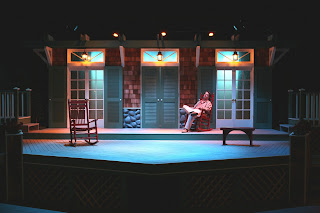You may be asking yourself "why Shakespeare? How if this relevant today?" The truth is that, aside from the language barrier that most people encounter that are unfamiliar with Shakespeare's work, all of Shakespeare's plays have plots that somehow relate to life today.
Take for example, Twelfth Night's subject of sacrificing everything for the love of another person. This is especially relevant with the female population today. The way young girls and women are portrayed in books and movies today give off the impression that they are willing to do anything for love. When reading through Twelfth Night, it seems apparent that Viola could have left long before the end of the play when she reveals herself to be a boy. By staying, she is risking ruining her whole relationship with Orsino; risking losing his trust forever. But she chooses to risk it all and stay in hopes of becoming closer to Orsino and hoping that his feelings for Olivia fade.

Also, the general attraction that men have to women who are stunningly beautiful and rich even if they are shallow, cruel, or just genuinely not interested in them at all. This is another theme that has been carried on in todays entertainment. Almost every romantic comedy you can see today is about one girl who is in love with one boy, but that one boy loves someone else, and that someone else has absolutely no interest in them. It's the classic "Love Triangle" that has always been in stories and always will be.
All of these photos posted in this entry are films made within the past 10 years that have adapted one of Shakespeare's plays into a modern day setting to make it relatable to today's population. 10 Things I Hate About You and Deliver Us From Eva were both based on Taming of the Shrew, O was based on Othello and, as previously stated, She's The Man was based on Twelfth Night.

These are all examples of how, even though the plays of William Shakespeare's plays have around for centuries, all of the plots and ideals of the shows still completely apply to life today. You just have to, when reading them, think about the deeper meanings and less about the language and the time period. At the end of the day Shakespeare exposes all his characters as all being imperfect humans, which is a running theme in all plays, musicals, films, music, books, etc. The monograph I've chosen in this case in entitled "Twelfth Night and the Renaissance of Man" by Toni Rudat. An interesting quote from Rudat comes as
follows:
"The audience of Twelfth Night is confronted with an unordered society that consists
of characters that absolutely lack the renaissance ideals of how humans should be."
Rudat, Toni. Twelfth Night, and the Renaissance Idea of Man. Druck and Bindung: Books on Demand, 2010. pg. 1-2. eBook



















